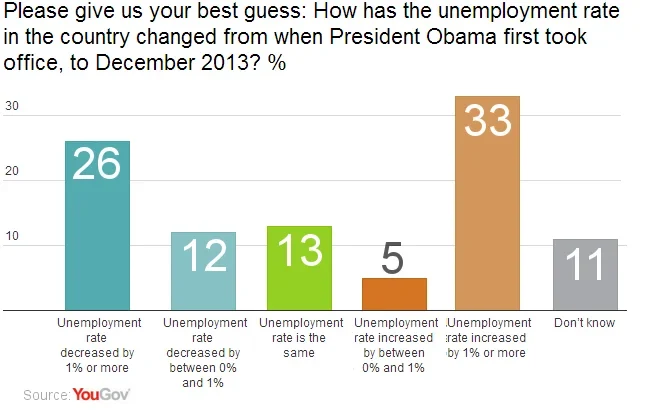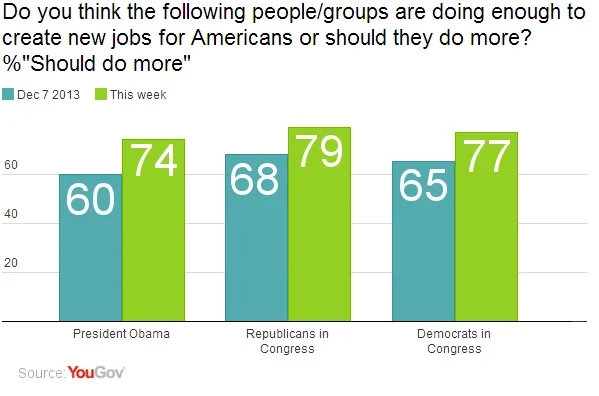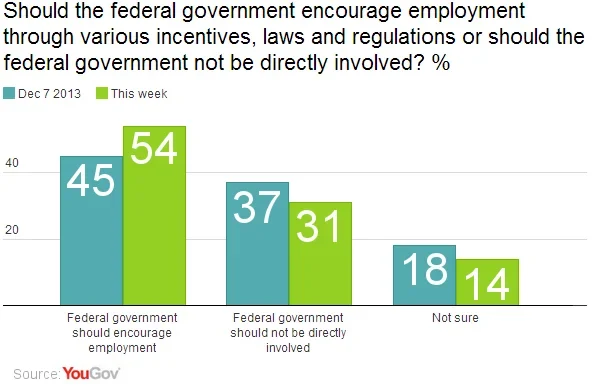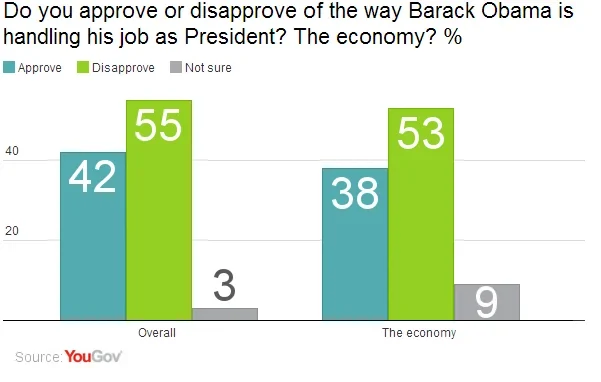A majority of Americans think that Congress and the President need to do more to help job creation, and the pressure is increasing.
Last week’s report of sluggish job creation, with only 74,000 new jobs in December, has extended Americans’ pessimism about the economic future. The unemployment rate dropped below 7% for the first time in all of the Obama Presidency, but not because of those 74,000 new jobs; more people gave up looking for work – at least temporarily. The latest Economist/YouGov Poll continues to find a public not expecting lots of new jobs anytime in the near future.
Guessing President Obama's record on unemployment
In fact, many aren’t even sure that the jobless rate has gone down since the President was inaugurated. Even though the jobless rate is more than one point lower from what it was for January 2009 (dropping to 6.7% from 7.8%), only 26% say that is the case. More say the unemployment rate has increased by 1% or more.

There has been almost no change on this from a poll conducted in early December after that month’s jobs report was made public. And Democrats, who have been most likely to see silver linings in jobs reports during this Democratic Administration, aren’t sure about the movement in the jobs figures either. Barely half of Democrats think the rate has dropped at all.
Who's to blame?
There is no shortage of blame to go around: three in four Americans say both the parties and the President need to do more to create new jobs for Americans. The assessments of the Congressional parties were not nearly as harsh last month. The percentage saying each should do more has jumped more than ten points in the last month. For the President, last month 60% said he should be doing more; that figure has jumped to 74% today.

Perhaps the additional month of slow job growth along with the years of the Great Recession has made more Americans desirous of government action. This is a change from last month’s data. This month, more than half want the government to encourage employment through incentives in principle; last month only 45% favored those actions. The percentage saying the government should not be directly involved has dropped to less than a third.

The desire for government action of some sort has increased among all political groups – Republicans, Democrats and independents, although 54% of Republicans still think the government should not be directly involved in job creation (of course, most Republicans, like Democrats and independents think Congress and the President should be doing more to create jobs).
Expectations for the future job creation and the overall economy remain low.
- Only 18% think there will be more jobs in the next six months than there are now.
- Only 28% believe the unemployment rate will decrease in the next year.
- Only 34% say the rate will drop in the next five years.
On each of those questions, a similar percentage expect things will continue to get worse.
Presidential approval
The President’s overall approval rating is at 42%, about where it has been for most of the last year. 55% disapprove. Approval on specific issues is even lower: only when it comes to terrorism (47%) and education (43%) is the President’s job rating any higher than the overall public assessment of his performance. On the critical issue of his management of the economy, just 38% approve. 53% disapprove.

Looking ahead
As been the case for all of the President‘s time in office, the economy remains the country’s most important issue. And opinions about it have been mostly negative. Americans do feel better about the state of the economy than they did at the end of 2010 and during much of 2011. In the fall of 2011, as few as 6% said the economy was improving. Today, more than a quarter say it is. Two years ago, a majority said the economy was getting worse; just under a third think that today.
But today’s figures are not good. And majorities expect that the future – short and long term – is likely to be at best a mix of good and bad times. Just 14% expect mostly good times in the next year; 17% expect good times over the next ten years.
Image: Getty
Full results can be found here.
Economist/YouGov poll archives can be found here.








